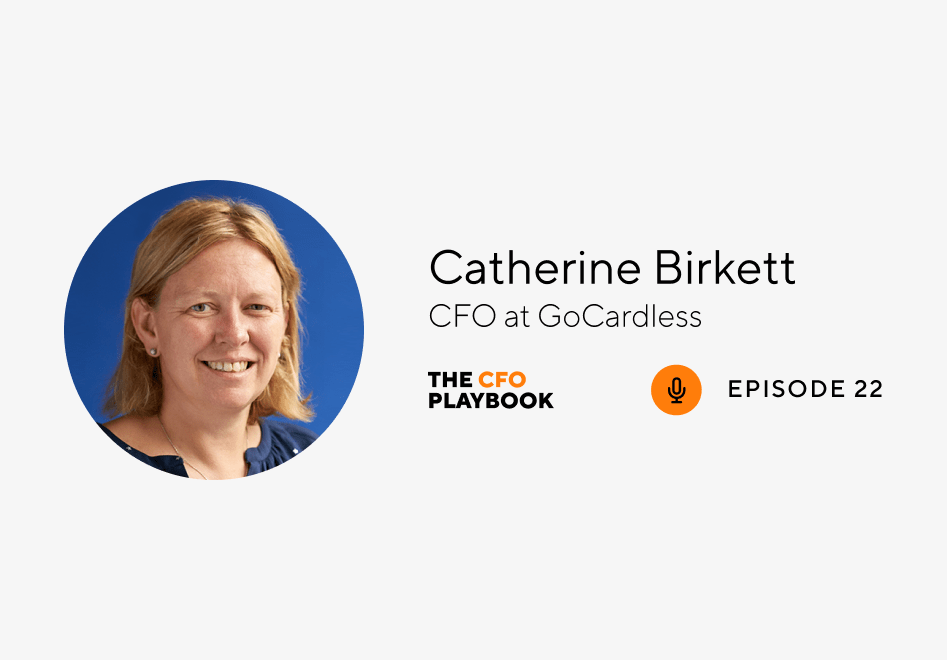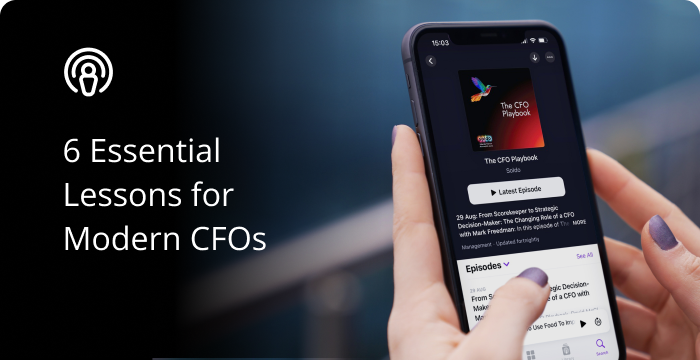5 tips to help young CFOs succeed
GoCardless’ CFO Catherine Birkett on the steps you need to take when you’re new to finance leadership.
Listen to the full conversation
Catherine Birkett knows a thing or two about diving headfirst into new leadership roles.
At the age of only 31, Catherine became the CFO of telecommunications company Interoute. Nearly twenty years later she is now the CFO at GoCardless, the online payment service provider that has risen to become one of the UK’s most prominent fintechs.
Everything Catherine knows about being a CFO she learnt from being ‘thrown into the deep end from day one’.
We recently interviewed Catherine on The CFO Playbook, where she talked about the challenges a young CFO faces and what her own experiences taught her.
Here are Catherine’s best tips for young or new CFOs learning to navigate the waters.
1. Get involved in business planning
The CFO role requires you to have a strategic mindset. You have to understand the business inside out – beyond just the financials.
A great way to improve strategic thinking is to get involved in business planning, especially if you’ve never been in a leadership role before.
Catherine says:
‘Being involved in planning and actually getting to understand how the business really works is so useful and vital for you to carry on and progress through your career’.
When you understand the big picture, you can define your goals as a CFO around the greater success of the business.
2. Build a diverse team
Don’t settle when it comes to hiring – you’re going to need the best of the best to truly succeed as CFO.
Looking back, Catherine wishes she pushed harder to get the right team in place when she first took on the role of CFO. She struggled her first few years due to the fact that she was missing that strong support system.
A good team possesses skills that complement the abilities of the CFO, Catherine says: ‘What I actually realised over those two to three years was it was really important that I found people within my team that complemented my weaknesses’.
Rather than hiring those who are similar to you, look for people who excel in the areas you feel less confident about. The more skills and opinions you can add to your team, the more balanced the dynamic will be.
Catherine notes:
‘At least 75% to 80% of what I’ve achieved is because I’ve been able to build an amazing team behind me. And I would not have had the success without the team I’ve got’.
3. Say yes to more
While controlling spend is crucial, supporting the growth of the business is even more important.
Successful CFOs aren’t afraid to say yes to risk when the opportunity is right, Catherine says:
‘I always teach my team that we are a service to the rest of the business. We actually need to try and say yes to most things’.
As an advisor to the CEO, you need to have a strategic vision for the company in order to drive success – you’re the sounding board that enables the CEO to make smart decisions.
And that requires saying yes to the right opportunities.
4. Be patient with yourself
Confidence comes with time and experience. Moving up to a financial leadership position is a big step and an intimidating one at that. But we all have to start somewhere. Be patient with yourself as you grow into your role.
Catherine explains confidence doesn’t come overnight:
‘The true realisation of that was what I managed to do at GoCardless, because it’s become clear to me that I didn’t just do it once. I’m repeating a lot of the successes that I had [at Interoute], and I think that’s made me really feel like, “Okay, now I do know what I’m doing.” And I can’t tell you how important experience is’.
It can be overwhelming at first, but each new experience is an opportunity to learn how to be a better CFO. If you can push through the hard moments, you’ll learn to feel confident in your abilities.
5. Plan ahead
The biggest part of a CFO’s job, according to Catherine, is to look ahead.
Ask yourself important questions like:
- Where is this business going?
- How risky are these investment plans?
- What does the profit or loss margin look like if we do x, y, or z?
Catherine says she always has a Plan B ready to go:
‘I don’t necessarily discuss that Plan B with anybody else, but in my head, I know that I am tracking things sufficiently to know [what to do] if I see a deviation from the revenue line in some way’.
When you plan for the future, you can better prepare yourself for change. Because success doesn’t come to those who are too afraid to change course when needed.
Conquer the deep end
The role of CFO is fraught with challenges, especially for someone young or new to the role, but it’s also an incredible place to learn how to be a business leader.
Remember to:
- Get involved in business planning
- Build a strong and diverse team
- Say yes to growth opportunities
- Be patient with yourself
- Look for opportunities that will build your confidence
- Always think ahead
Most importantly, don’t be afraid to dive into the deep end – you never know what you might learn.
Listen to the full episode
Hear the full conversation with Catherine Birkett, and catch up on the latest episodes.










